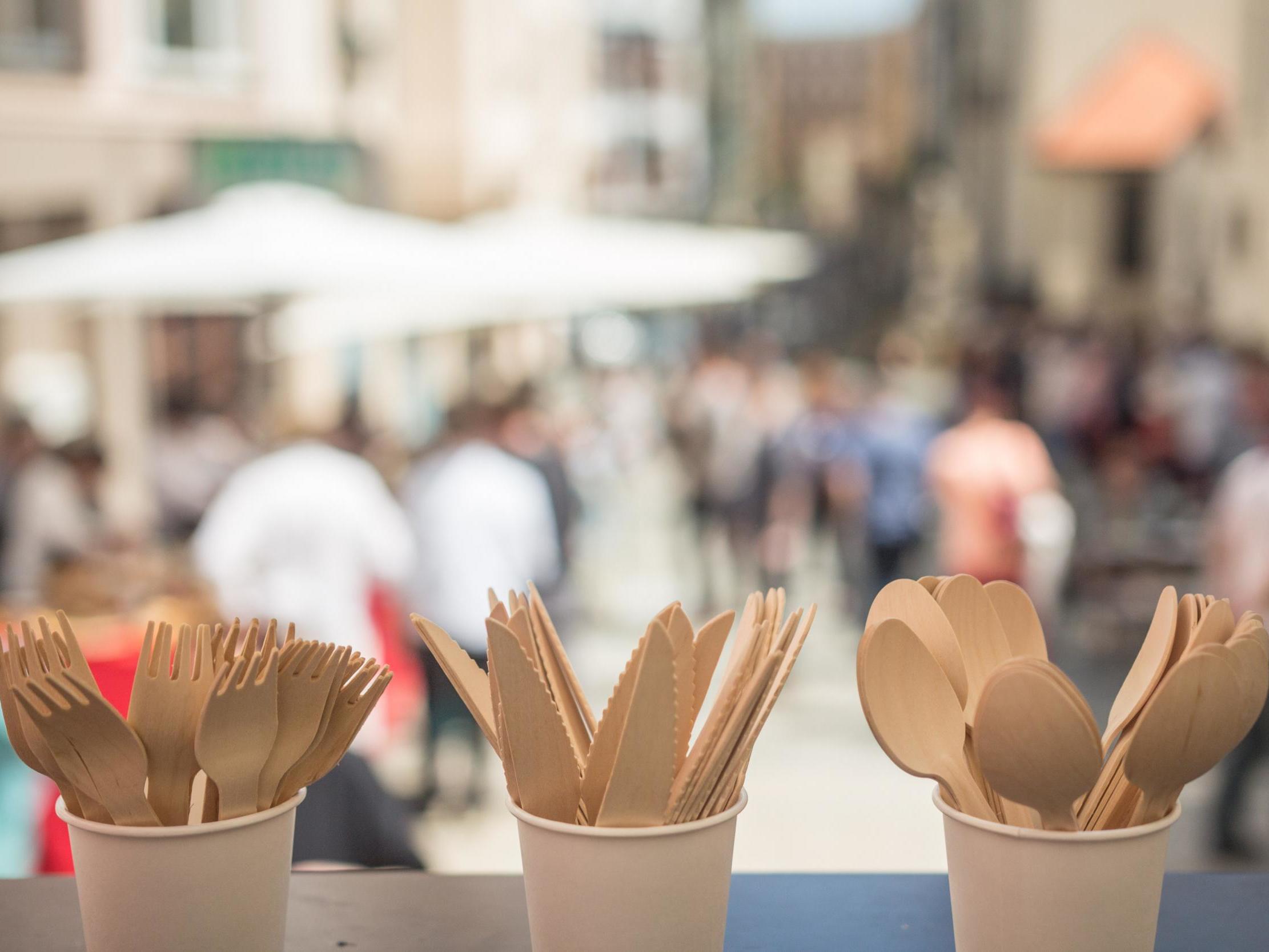Supermarkets bringing in even more damaging packaging in rush to ditch plastic, study finds
Race to find alternatives leads to rise in items creating more greenhouse gases

Supermarkets and food giants ditching plastic packaging are swapping to even more environmentally damaging materials, an investigation has found.
Under pressure from the public to cut plastic pollution, companies are introducing cardboard containers coated with non-recyclable materials and bags that created “much higher” emissions of greenhouse gases, researchers said.
The new items, such as compostable or wooden cutlery, may have potentially greater environmental consequences, including higher carbon emissions, than plastic.
The Green Alliance interviewed insiders with five UK supermarkets and seven big-name companies that produce groceries and personal and cleaning products, concluding that “a disjointed and potentially counterproductive approach to solving plastic pollution is emerging”.
The report says that more than two years after the release of Blue Planet II, relatively little has changed, with supermarkets still putting the equivalent of 900 pieces of single-use plastic on the shelf for every person in the UK every year.
One supermarket said complaints about plastic from customers had been “ferocious”, revealing: “It’s been mostly complaints, saying that plastic is evil and has no place, regardless of any positives it might have in addressing food waste and whatnot… It’s been ferocious. We’ve seen an 800 per cent uplift in customer queries in the last year alone.”
Another insider said some decisions had been taken knowing it could actually increase some environmental burdens.
But customer outrage was not necessarily translating into changes in purchasing habits, the report authors found. One interviewee said: “When it comes down to real consumer behaviour, they ain’t changing yet.”
Some supermarkets have recently replaced single-use plastic bags for loose produce and bakery items with single-use paper bags, described by the Green Alliance as “a worrying trend”. Paper bags, it said, “which are often just as unnecessary as their plastic counterparts, can have much higher carbon impacts, though this can depend on material sources and product specification”.
Decisions to ditch plastic were often made without considering the environmental impact of substitute materials, or whether there was adequate collection and treatment infrastructure in place.
“Consumers… are hugely confused about what bio-based, compostable and biodegradable mean,” the report said.
Some companies that had tried ‘compostable’ plastic suggested it did not degrade as expected.
And many insiders wanted the government to have a bigger role in directing plastics use, recycling and refilling schemes as well as setting standards across the industry.
Adam Read, external affairs director at Suez recycling and recovery UK, said: “As the war on plastics rages, avoiding unintended consequences should be at the forefront of everyone’s minds … Change must be managed and planned.”
Libby Peake, of the Green Alliance, said almost all companies brought up reusing and refilling schemes in interviews.
“One problem is you have to embed behaviour,” she told The Independent. “Most supermarkets allow people to take their own containers for delicatessen counters but not many people know.”
The inventor of very thin plastic bags for fruit and veg designed them to be reused many times over so they would be less harmful than single-use paper bags, she said, but the best option was for single-use materials to be phased out.
Fibreboard trays and paper straws are coated in non-recyclable materials, while bags claimed to be compostable or bio-based will damage plastics streams if wrongly put in the recycling, just as ordinary plastic bags will damage recycling.
Andrew Opie, of the British Retail Consortium, said: “All responsible retailers agree that climate change needs to be at the heart of their business, whether that is sourcing products or changing packaging.
“Plastic remains the most effective material in many circumstances – for example cucumbers wrapped in plastic last 14 days longer, reducing food waste.
“A coherent waste and resources strategy is one that prioritises reducing the environmental impact of the things we buy, not simply reducing plastic use.”
A spokesperson for the environment department said the government was already leading global efforts to tackle plastic pollution but added: ”Bold work is already under way to minimise all forms of waste, drive resource efficiency and move towards a circular economy through our ambitious resources and waste strategy.
“Innovative new packaging types could help reduce the environmental impact of packaging, which is why we ran a call for evidence last year to help us consider the development of standards or certification criteria for bio-based, biodegradable, and compostable plastics and to better understand their effects on the environment and our current waste system.”
The government also says that through the plastics research and innovation fund and the plastics and waste innovation fund it it funding research and development, including pioneering approaches to boosting recycling and reducing litter. Together with industry it is putting money towards developing new “smart, sustainable” plastic packaging.
Join our commenting forum
Join thought-provoking conversations, follow other Independent readers and see their replies
Comments
Bookmark popover
Removed from bookmarks